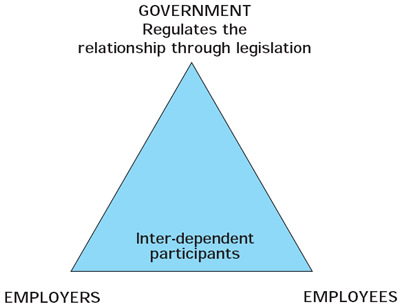*************************************************************************************
Over the last few years, employees have become more and more aware of
their rights within organizations. Huge amounts of money have been paid
out to employees, and small businesses are now realizing the importance
of managing employees within the boundaries of legislation and good
practice.
The Tanzanian Government assists in the employer / employee relationship
by legislating human resources issues in the following Acts:
- The Employment and Labour Relations Act (ELRA), 2004 (No.6).
- The Labour Institutions Act, 2004 (No.7).
- The Occupational Health and Safety Act, 2003
The employment contract also serves as a foundation of the employment
contract.
Employees sell their labour to employers. Employers make use of
employees to ensure a return on investment to shareholders. We call this
the Employer / Employee Triangle.
The Employer / Employee Triangle

THE EMPLOYER / EMPLOYEE RELATIONSHIP
The development of policies is intrinsically linked to the
Constitution of the United Republic of Tanzania and the labour laws of
the country. It is incredibly important that no matter how small your
business, that the letter of the law is followed when it comes to
employment policies and labour practice.
The relationship between employees and your business is governed by the
following laws:
- Common Law.
- Constitutional Laws.
- Contract of Employment
- Agreements entered into with Trade Unions / Bargaining Councils.
The United Republic of Tanzania’s legal system is based on the
English Common Law system. The first and fundamental premise of the
constitution is the Bill of Rights, which lists the fundamental
rights of all people living in Tanzania. This Bill is the foundation
that governs all other legal requirements in the workplace.
The following rights are described in the Bill:
- The right to dignity.
- The right to freedom and security of the person: [This includes the right to make decisions on reproduction and medical treatment and the right not to be subjected to medical or scientific experiments without informed consent.]
- The right to privacy .
- Freedom of expression.
- Freedom of association – the right to join a union.
- Freedom of trade, occupation and profession.
- The right to fair labour practices, i.e. no person may be unfairly discriminated against at work.
- The right to an environment that is not harmful to one’s health or well-being.
- The right to have access to adequate housing.
- The right to education.
- The right to fair social services.
- The right to be treated fairly, even if you are a prisoner.
- The right to information e.g. one’s own medical records.
- The right to health care, water and social security.
Employers and managers have the following responsibilities:
- Protecting and serving the interest of the business.
- Determining the objectives of the business.
- Arranging the best use of organizational resources (this includes human resources).
- Ensuring customer satisfaction.
- Making sure that the necessary standards of the product or service are maintained.
- Making sure that the operations of the business are carried out in a cost effective way, this includes the control of labour costs.
Employees have a particular role to play, they must:.
- Behave in the required manner at work.
- Perform their work as required.
- Remain loyal and obedient to the employer.
- Stick to reasonable rules and instructions.
- Exercise their right to association, bargain and strike in a responsible manner.
* Buy the SME Toolkit for more details about employee and employer relationship